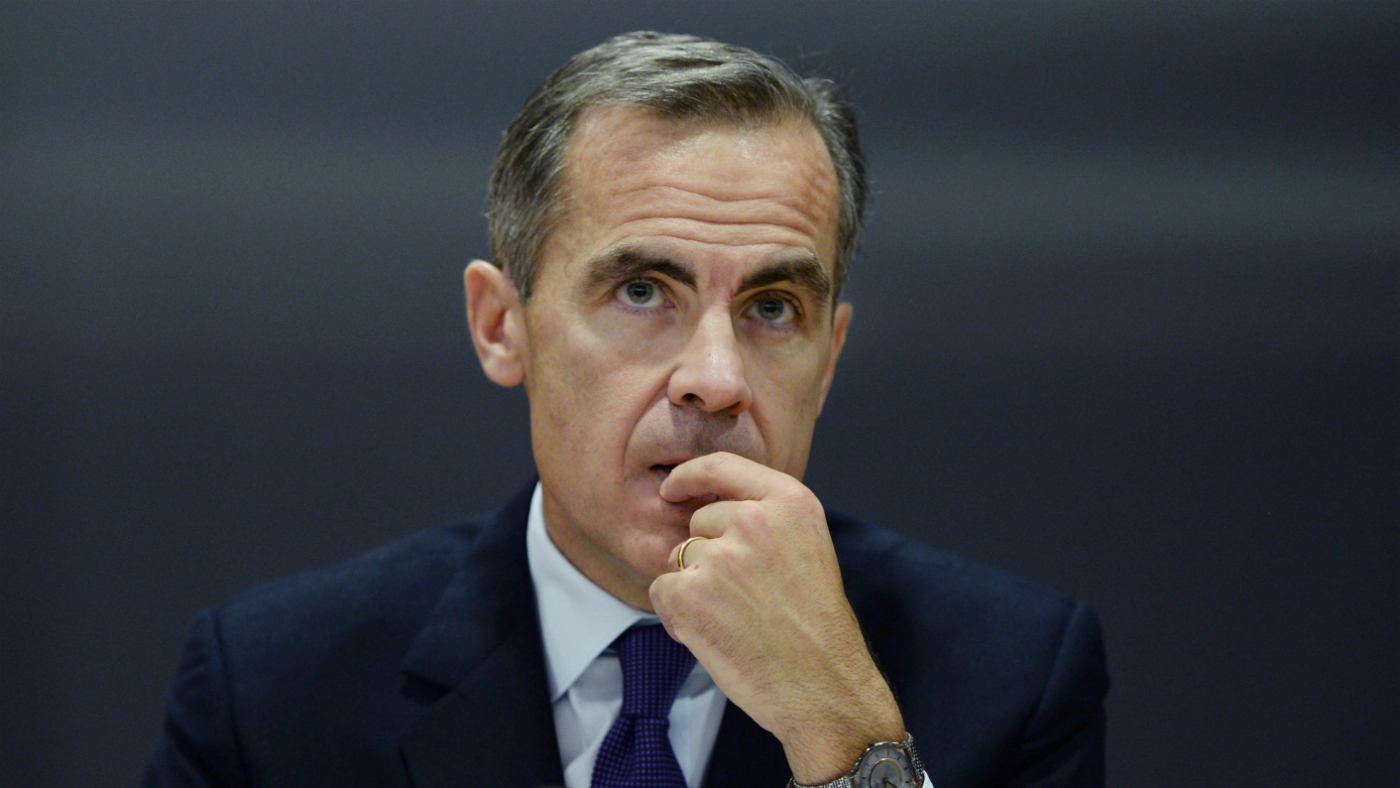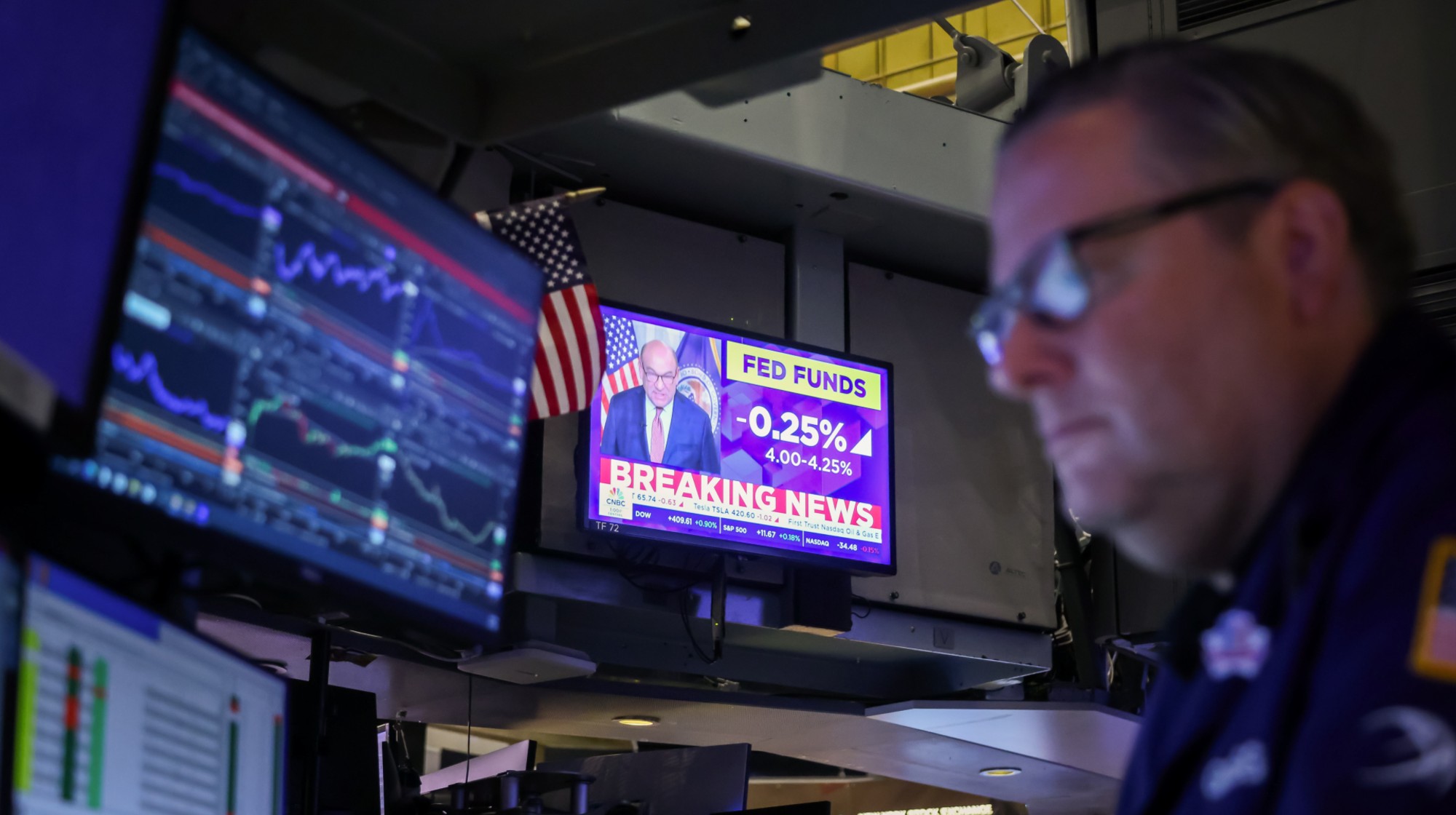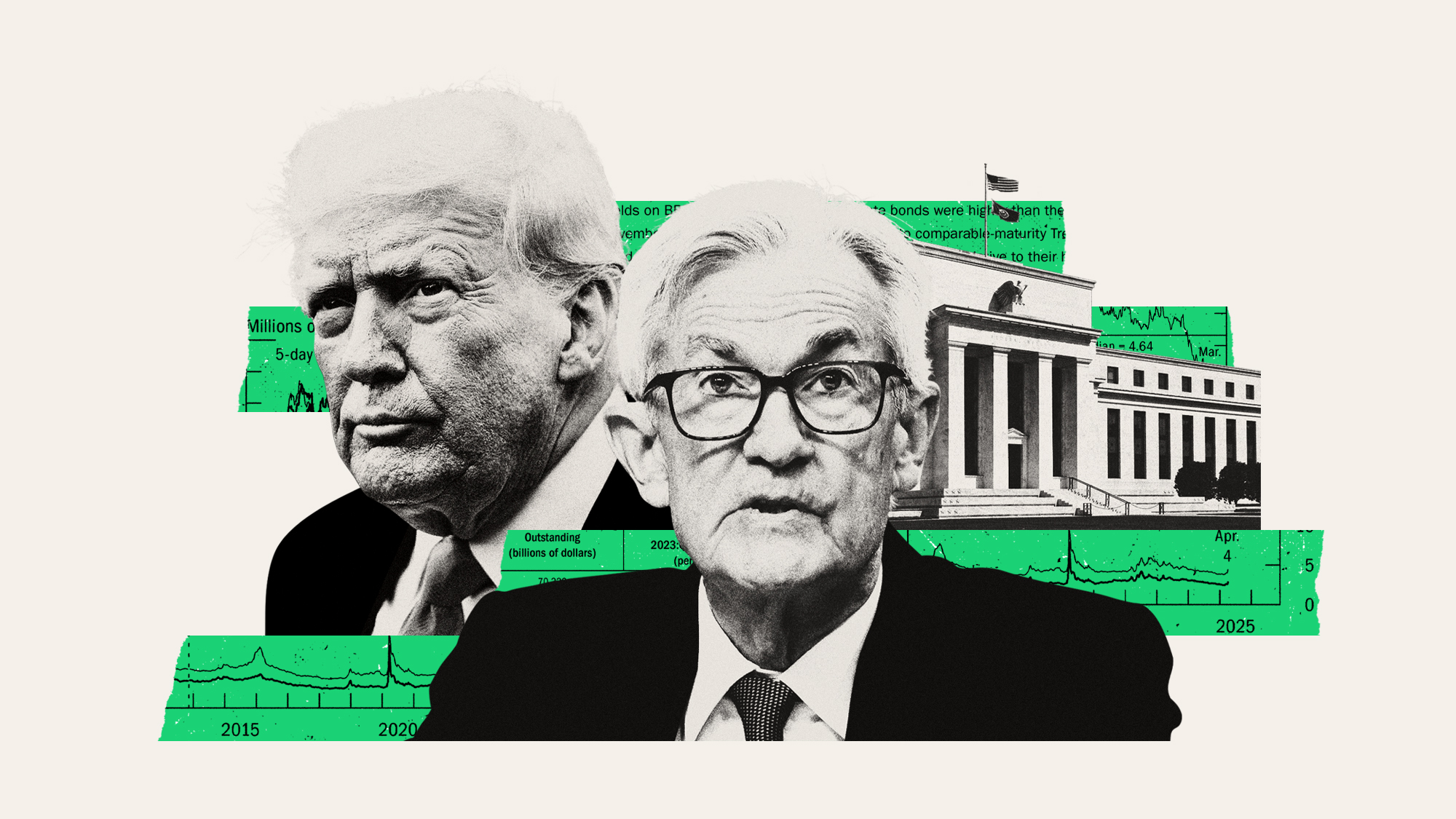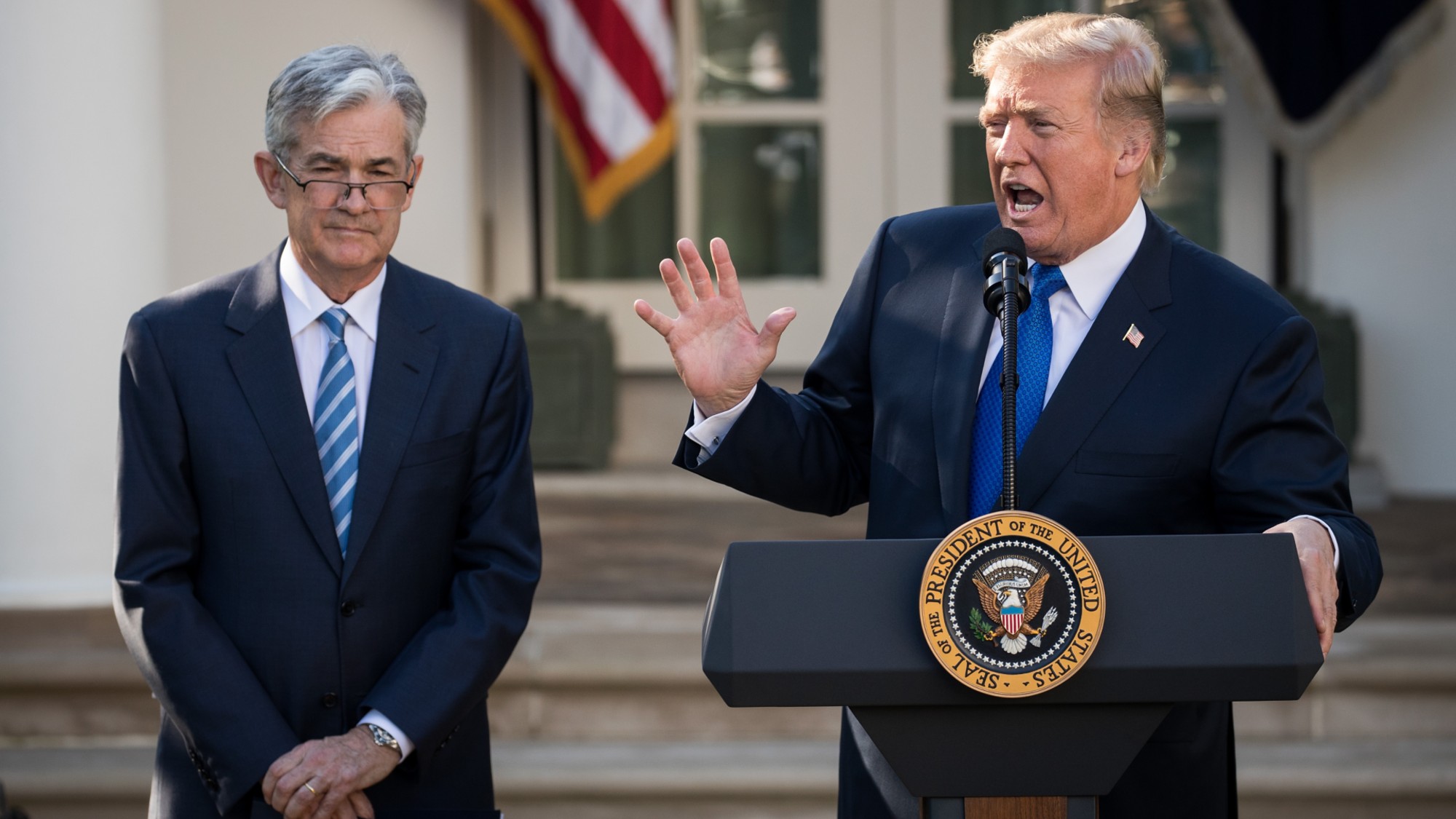Pound plunges after Bank of England's dovish rates signal
Central bank revises its growth forecast for UK economy

A free daily email with the biggest news stories of the day – and the best features from TheWeek.com
You are now subscribed
Your newsletter sign-up was successful
Interest rates: is rates uncertainty the real threat now?
28 September
UK interest rates will be kept on hold for longer than the Bank of England currently forecasts, to at least May and maybe even as late as August next year.
The Week
Escape your echo chamber. Get the facts behind the news, plus analysis from multiple perspectives.

Sign up for The Week's Free Newsletters
From our morning news briefing to a weekly Good News Newsletter, get the best of The Week delivered directly to your inbox.
From our morning news briefing to a weekly Good News Newsletter, get the best of The Week delivered directly to your inbox.
Or at least, that is the latest view of the Centre for Economics and Business Research, The Guardian notes. Many other economists say it will still be early next year, taking their lead from Mark Carney, the Bank of England governor, who has made elliptical comments that the current global economic tumult does not unduly concern him or affect the timetable for 'lift-off'.
The most honest economists admit that they simply do not know how long rates will remain on hold. This uncertainty has fed into markets, which are extremely volatile amid evidence of a hardening recovery in key developed markets and concurrent concerns that the global economy is on the verge of a profound slowdown. Some even say a lack of clarity from central bankers is more dangerous in itself than either a rise too soon or too late.
The arguments against rising now are summed up by the CEBR analysis. It warns the UK's steady economic performance "may not be sustainable if economies elsewhere continue to struggle", lowering its growth forecast for next year to two per cent and 1.7 per cent in 2017.
On the other hand, there are those saying rates have already been held too long during a strong recovery in economies such as the US and UK, where inflation is low due to a commodities slump but in which jobs are being created and steady growth registered. They add that long-term low rates have distorted markets and created asset and debt bubbles that already pose a threat down the line.
A free daily email with the biggest news stories of the day – and the best features from TheWeek.com
Bill Jamieson, writing in The Scotsman, cites the arguments on both sides but adds that what markets are craving now is certainty. This was apparent in the market reaction to the US Federal Reserve's most recent hold, which sent stocks into a tailspin.
"For now the rate guessing game continues – and the danger here is that the prolonged uncertainty and its de-stabilising effects on financial markets are causing more damage than any premature or overly delayed rise," Jamieson concludes.
Is the Fed backtracking on interest rate guidance?
25 September
The Federal Reserve looks to be attempting a volte-face on its monetary policy guidance, which last week had been interpreted as a sign that "lift-off" for interest rates would not happen until 2016.
In its commentary published alongside the decision to hold rates last week, the Federal Open Market Committee left unchanged a "dot plot" pointing to a rise in rates before the end of the year. But investors read between the lines of an extremely bearish analysis outlining the threat of a slowdown in China, and concluded that borrowing costs could be held until well into next year.
After a week of more hawkish commentary from various economists connected with the central bank, chair Janet Yellen gave a speech yesterday in Massachusetts in which she explicitly stated that the Fed intends to make the first move this year.
Her words have injected some confidence into markets, which were buoyed further by revised data showing the US economy expanded by an impressive 3.9 per cent in the second quarter.
"When the Fed didn't hike everyone started to worry they knew something we didn't know about the economy," Andreas Koester of UBS Global Asset Management, told the Wall Street Journal. "What we heard yesterday was a confirmation… they're still on track."
Analysts are currently lining up to argue the case for raising rates, pointing to "distortions" in markets where there is no incentive to save and that appears dominated by asset bubbles such as property. Yellen acknowledged these issues in a speech that highlighted "excessive leverage and other forms of inappropriate risk-taking" if rates are held too low for too long, the Financial Times notes.
Should UK mortgage holders be preparing for the Bank of England to lift as well? Not yet, based on comments from deputy governor of the Bank of England, Ben Broadbent. He told Reuters he is not "on the brink" of voting for an increase and that wages would need to rise much faster for that to change.
Interest rates: where to now for UK rate setters?
22 September
Federal Reserve rate setters might have increased rates last week, but eventually decided the market could not take it. They not only held but issued extremely bearish guidance on global growth.
Markets, which had been betting on – and according to most analysts hoping for – a hold, have taken the news badly.
What does the UK do now? Mark Carney has repeatedly insisted that the slowdown in China does not unduly concern him and that its effects in the UK will be limited. It was a point he stressed again in front of the Treasury Select Committee last week as he appeared to stick to his "early 2016" timetable for a first hike, Reuters notes.
George Osborne certainly thinks this is the likely course. The Guardian reports that during an interview in which he talked up UK growth, the chancellor said "the general signal coming from the Bank and the Federal Reserve in the US is that the exit from very loose monetary policy is going to come," adding that it would likely come soon.
On the other hand, the market reaction in the past week suggests confidence is brittle and most economic news in recent days has been mixed at best. The Bank of England's chief economist Andy Haldane even said in a speech on Friday that rates may even fall further towards zero before they rise again, according to Reuters.
It all amounts to a very mixed picture, but the smart money is pointing to a slower move towards a hike. In the US this means December at the earliest and possibly next year, in the UK perhaps the second quarter of 2016 or even beyond the summer. This does not mean all agree such a delay is desirable, just what is likely given the wavering of central bankers.
Some are even suggesting we prepare for a Japanese-style 'lost decade'.
Writing in the Daily Telegraph, Matthew Lyn warns the "continuation of near-zero rates" will "destroy incentives to save", distort the capital markets, encourage people into risky investments in search of yield and keep alive a lot of "zombie companies" – but that markets had better get used to them anyway.
"[Mark Carney] told us to expect a rate rise when unemployment was below 7 per cent – but when it got there, he promptly forgot about it. Then we were told they would go up when wages were rising – but they are now going up by 3 per cent in real terms, a more than healthy rate, and there is still no sign of a hike,” Lyn writes.
"Some time soon Mr Carney will be telling us that the rate rise will come when Arsene Wenger splashes out a couple of hundred million for Gareth Bale, or Yvette Cooper cracks a joke that someone actually laughs at – both of which we can safely assume will never happen," he concludes.
Interest rates: Fed holds – and gives few clues on timing
18 September
"The tortoise beat the hare in Aesop’s fable," notes the Financial Times, "and in today’s monetary tale the doves" who are calling for a slower lifting of rates from record lows "clearly have the hawks on the run."
The Federal Reserve last night revealed it had voted to keep US interest rates on hold, in line with the marginal majority view of economists and investors.
Moreover, says the Times, in spite of "talk of a hawkish hold, where policymakers would still stress their readiness to act soon, the Fed sprung a dovish surprise on investors" in the commentary accompanying its report.
The "dot plot" of forecasts was left largely unchanged for the rest of this year, meaning rate setters are still overall predicting a first rise in 2015.
But "three members of the Federal Open Market Committee thought they would stay their hand until next year, and one even predicted an interest-rate cut", says the paper. The path forward is much less clear than many had hoped.
This lack of clarity – and the prospect of uncertainty continuing to dominate in the lead-up to the next Fed meeting in October and beyond – undermined the bounce on markets, with US indices up around one per cent in volatile trading immediately after the announcement and eventually closing lower.
Asian markets were mixed, European have opened in the red and even gold eked out only a modest gain.
The main reason for the hold was China, or more specifically, as the BBC's Robert's Peston explains, the concern that "China's difficult-to-precisely-gauge slowdown is acting as a severe brake on growth in emerging economies [and has] made American investors in shares feel a bit poorer and made it harder for American exporters to generate sales".
"The point is that a fall in share prices as a result of the depressed global economic outlook, together with an associated rise in the dollar (up 15 per cent over the past year) as investors have shifted capital from flagging emerging markets to a more buoyant US, have already tightened monetary conditions in America," says Peston.
So when will rates actually rise? Well, as said officially the projection is still for this year for the first move and then very slowly thereafter. Some say this timetable now looks optimistic and markets are now betting on an early 2016 rise, in line with projections from the Bank of England.
Rates will rise when "there is a further improvement in the jobs market and when the Fed is 'reasonably confident' that inflation is on course to move back up to 2 per cent", says Larry Elliot in The Guardian. "Not yet, in other words."
Interest rates: will Fed choose 'hawkish hold' or 'dovish hike'
17 September
It is one of the most debated interest rate decisions in recent memory.
The Federal Reserve's rate setting board began a two-day meeting yesterday, which will culminate today in a vote either to hike rates for the first time since the crisis, or delay again a move to normalise policy despite an apparently strong recovery – and while cheap borrowing costs continue to distort markets.
[[{"type":"media","view_mode":"content_original","fid":"84571","attributes":{"class":"media-image"}}]]
The decision is being presented as black and white, with economic optimists calling for a rise and those less convinced of the recovery, or who are concerned by the effects on debt-laden emerging markets, advocating a hold.
Markets, from equities to government bonds and commodities, are currently being defined by the prevailing view one way or the other.
But the eventual verdict will almost certainly be much less clear-cut.
Yes, rates will either rise or not, but the accompanying guidance is likely to play up or down the prospects for future rate rises in either case in such a way that the market reaction could be more muted – and short-lived – than the volatility in the lead-up might suggest.
The Financial Times says the two most likely outcomes are either a "hawkish hold", which would see the board signal a move in October or December, or a "dovish rise", where a smaller quarter-point rise comes with a virtual guarantee that "no more moves will come in 2015, and that subsequent increases will be very gradual".
Given that most economists agree "what matters more than the quarter-point move is the subsequent trajectory of interest rates", there is even some reason to suspect that getting the first move out of the way could even have the counter-intuitive effect of calming markets, which would move beyond a debate over the symbolic shift and have a clearer picture on what is coming.
But most economists still seem to believe the uncertainty over the global economy will win out the day for the doves, especially as inflation is falling and exerting no pressure.
While a panel surveyed by CNBC voted marginally for a rise, a similar proportion polled by the FT voted against and less than a third of those spoken to by Bloomberg are expecting an increase.
-
 How the FCC’s ‘equal time’ rule works
How the FCC’s ‘equal time’ rule worksIn the Spotlight The law is at the heart of the Colbert-CBS conflict
-
 What is the endgame in the DHS shutdown?
What is the endgame in the DHS shutdown?Today’s Big Question Democrats want to rein in ICE’s immigration crackdown
-
 ‘Poor time management isn’t just an inconvenience’
‘Poor time management isn’t just an inconvenience’Instant Opinion Opinion, comment and editorials of the day
-
 Powell: The Fed’s last hope?
Powell: The Fed’s last hope?Feature Federal Reserve Chairman Jerome Powell fights back against President Trump's claims
-
 The end for central bank independence?
The end for central bank independence?The Explainer Trump’s war on the US Federal Reserve comes at a moment of global weakening in central bank authority
-
 Who will be the next Fed chair?
Who will be the next Fed chair?Today's Big Question Kevin Hassett appears to be Trump’s pick
-
 Should Labour break manifesto pledge and raise taxes?
Should Labour break manifesto pledge and raise taxes?Today's Big Question There are ‘powerful’ fiscal arguments for an income tax rise but it could mean ‘game over’ for the government
-
 What are stablecoins, and why is the government so interested in them?
What are stablecoins, and why is the government so interested in them?The Explainer With the government backing calls for the regulation of certain cryptocurrencies, are stablecoins the future?
-
 Fed cuts interest rates a quarter point
Fed cuts interest rates a quarter pointSpeed Read ‘The cut suggests a broader shift toward concern about cracks forming in the job market’
-
 Trump's threats to fire Jerome Powell are unsettling the markets
Trump's threats to fire Jerome Powell are unsettling the marketsTalking Points Expect a 'period of volatility' if he follows through
-
 How will Wall Street react to the Trump-Powell showdown?
How will Wall Street react to the Trump-Powell showdown?Today's Big Question 'Market turmoil' seems likely